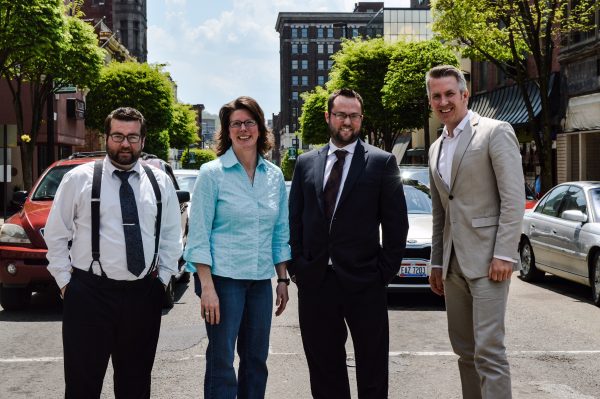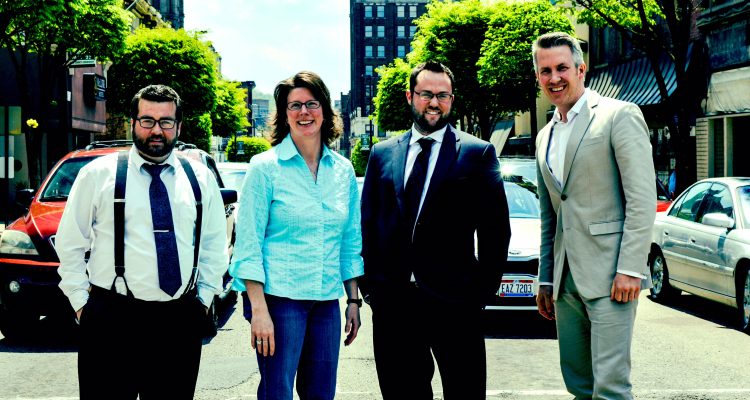They all have lived elsewhere. Three are natives, and one is a transplanted West Virginian who has been in Wheeling for the past decade.
Each brings something different to the table: one has experience with architecture; another knows the business world; one owns a law degree; and the other is most knowledgeable about the history of the Friendly City.
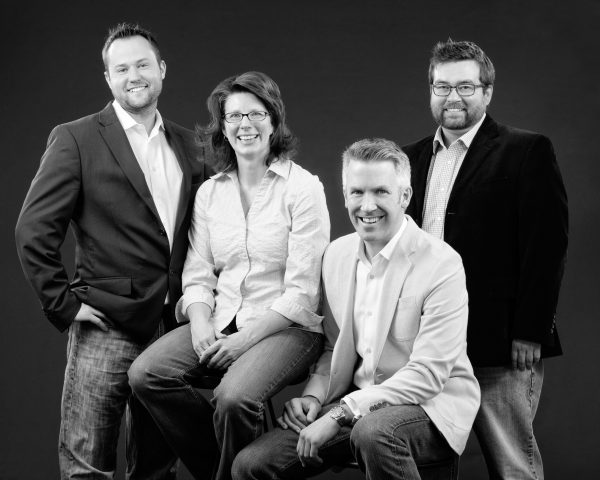
Although they are not a “team” per se, they have collected each other for the exact same reason – they believe Wheeling’s 2016 municipal Election Day could be the most important one since initially settled in 1769 as Wheeling, Va.
Chad Thalman, Jeremy Morris, Wendy Scatterday, and Glenn Elliott all own day jobs, but they also possess something similar, and that’s a belief that the rebirth of Wheeling has yet to truly emerge from the womb. In labor? Yes, and everyone is eager for the pregnancy to finally end after more than 30 years spent reaching full-term.
Ward One:
Thalman is attempting to follow in the footsteps of current Councilwoman Gloria Delbrugge, a lady who will have spent 12 years representing the Ward One but has chosen to retire her political career. She answered all of the calls, returned all of the messages, and attended all of the meetings and functions, and Warwood, Clearview, a portion of North Wheeling, and North Park are better neighborhoods today because of her level of dedication.
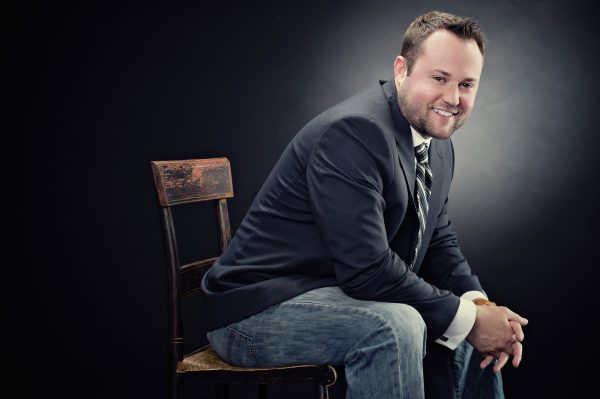
Thalman grew up here, and, for the most part, he’s been educated here. After graduating from Wheeling Central Catholic High School in 2000, he earned his psychology degree from West Virginia University in 2004 and then his graduate degree in business administration from Wheeling Jesuit University in 2009. In between WVU and Wheeling Jesuit, Thalman left Wheeling despite being a member of the founding family of Warwood Armature.
But the family business did bring him home, and now he handles the sale management responsibilities. Warwood Armature was founded in 1927 and continues operating from all three of its facilities in the building, producing, and repairing electric motors with 55 employees on the payroll.
Novotney: Why have you decided to run for Ward One, Wheeling City Council?
Thalman: That was the reason why I moved back in December 2006 after being away for over six years. I came back, and this is my home. This is the city I care about.
I am tied to a family business, so I have no interest in being a career politician. I have no desire to go to Charleston or to Washington, D.C. But I do see serving on city council as a way to do my part to move Wheeling forward. I want help Wheeling be the best city it can be.
I think my business background is going to help me because operating a city is similar to running a business. The personnel issues, getting the right people in the right positions, the budgets issues, making smart investments, and minimizing waste are very important to the taxpayers. Plus, there are customer service issues, and there are marketing, branding, and perception issues. I think perception is something that Wheeling has struggled with for a long time. For a long time there’s been a “can’t-do” attitude here, and I think that’s no longer acceptable. I think in the last year or two the perception started to change.
I want to do my part to make sure we are moving in the right direction.
Novotney: What do you believe are the most important issues in Ward One right now?
Thalman: I think Greenhunter and the frack treatment plant is an issue that a lot of people were against. I don’t know anyone who was for that facility being built. That is something that I would stand against if it ever looks like it is moving forward.
I believe serving on council is helping to make Wheeling a desirable place to live, and one of the ways you do that is to make it a safe place. And I believe safety takes many forms, and one form is to having a well-trained, well-paid police force that is large enough to protect the citizens of our city. Obviously we do not want to have a police force that is so big that it is wasteful, but I think we definitely want one large enough that our neighborhoods are safe.
Novotney: What kind of campaign will you operate?
Thalman: I plan to knock on every door at least twice, and I plan on attending as many events in Warwood as I can. I don’t have all of the answers, but I want to listen to the people of Warwood, see what’s important to them, and see how they feel about the issues.
Novotney: Do you feel you have some big shoes to fill since you are trying to follow Gloria Delbrugge and the way she has represented Ward One?
Thalman: Gloria is very well liked, and she has always been extremely friendly to me. Anytime I have wanted to sit down and speak with her she has always taken the time to do that. When I told her that I was running she encouraged me to run. She’s given me some advice, too.
And I would never want to run against her. I think we all owe her a big thank you for the 12 years that she will have served on city council.
Ward Two:
Morris has guided Friendly City residents through a process of appreciating the history of Wheeling in his role as the executive director of the Wheeling National Heritage Corp., and he wishes to represent the Wheeling Island, downtown, and Fulton neighborhoods. A few of the projects he’s managed include the restoration of the Wheeling Island Flood Memorial, the continued development of Heritage Port, the upcoming installation of the Francis Pierpont statue, and Morris has also helped create ReInvent Wheeling, the South Wheeling Preservation Alliance, and the Wheeling Dog Park Association.
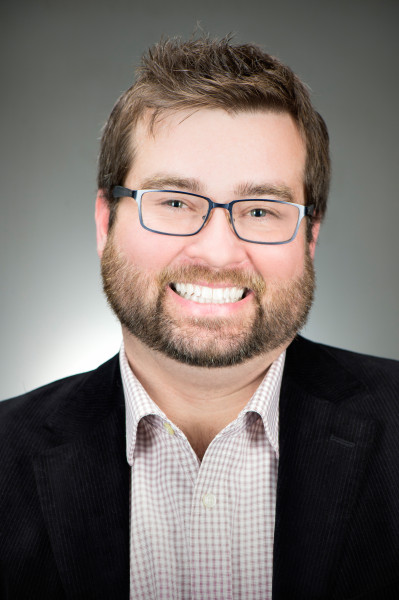
Morris moved to Wheeling in 2005 and now lives in North Wheeling with his wife, Mia, and 11-month-old daughter, Amelia. The 38-year-old knows a lot of about Wheeling, but he admits he’s not that knowledgeable about Fulton. Morris says, though, that’s going to change in the near future.
Wheeling Island resident Ken Imer currently represents those areas but has not been very active in the community since beating downtown resident Charlie Ballouz three years ago.
Novotney: You have played a most important role here as the executive director of the Wheeling National Heritage Area Corp., and now you wish to represent Ward Two. Tell me why.
Morris: I am doing this because I believe our downtown is at a tipping point. It’s been a 30-year slide for our community in general, but specially our downtown and every community in America is judged by on the health of its central business district. Right now we are at a point where there’s enough momentum and energy that we could change the aesthetics of the downtown, and we can entice entrepreneurs and small businesses to be more engaged in buying buildings and reclaiming vacant properties.
Novotney: Wheeling Island also appears to be at a tipping point what with many issues facing the future. What does Wheeling Island need moving forward?
Morris: In the long term I believe there needs to be some kind of solution to the flood insurance issues, but right now what is most important for Wheeling Island is its uniqueness. It’s the second most populated island in the country, so that sets Wheeling apart from every other community in the United States. That’s something Wheeling Island residents should be proud of.
And I know the residents of Wheeling Island are very proud of their history of surviving the floods that do hit because they have always worked as a true community during those times. It’s one of those things that are very special about the city of Wheeling. There’s no other place in West Virginia where citizens can say that they live on their very own island.
Novotney: There are residents of the Fulton section of Wheeling who have asked me who their council representative is. Would that change if you are elected to represent Ward Two?
Morris: The other parts of Ward Two will be areas where I plan to be in the near future so I can learn from those folks what their issues are. Those are neighborhoods in Wheeling that I have visited, but I also know that I need to get to know those areas much better than what I do now.
Ward Four:
Scatterday’s love for Woodsdale surfaced to the masses when she led a group of Woodsdale residents who were opposed to a proposed development on the hilltop ridge directly above Edgwood Street. “Woodsdale United” made the news, and the Wheeling Planning Commission did not completely approve of what the developers proposed.
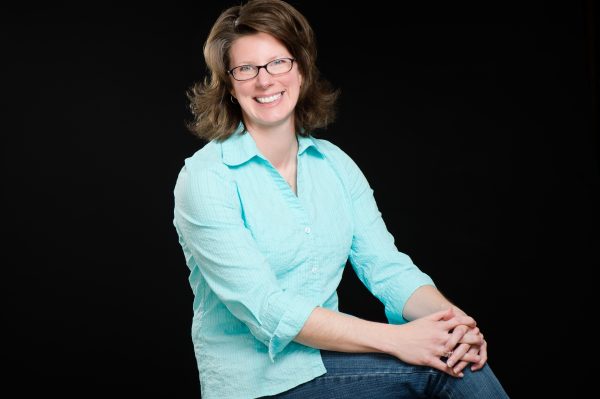
But the 1990 Wheeling Park High graduate claims no credit. She referred to the process, though, as, “amazing,” because she witnessed a return of people being heard by government, and she’s running to see that continue.
Scatterday, a 1995 grad of the University of Tennessee, has been home since 1998 and she owns no “beefs” with David Miller, Ward Four’s current council representative. She believes, however, she can offer an amount of time and a collective vision that would greatly benefit the included neighborhoods.
Novotney: You have been very active in the Wheeling community since you returned home seven years ago, and now you wish to increase your involvement by sitting on city council. Why?
Scatterday: I love Woodsdale and I love Ward 4. I love Wheeling. And there are a lot of specials parts of Wheeling that are located in Ward 4.
And I feel I am uniquely positioned with my background to be an innovative mind for our city. Wheeling is at a point of transition, and I would like offer up my abilities and to contribute those skills.
Plus, I learned a lot about the people of my neighborhood when the group “Woodsdale United” came to be. We are not a formal organization. We call ourselves a collection of concerned neighbors, but that experience taught me something very important about the idea that everyone’s voice matters. That was a time when folks didn’t feel as if their voices mattered, but that changed, and that taught me the importance of inclusivity and how absolutely critical that is.
That’s why I am really looking forward to engaging and meeting all of my neighbors one way or another. I do plan to go door-to-door, and when I do that, I will take with me a pad of Post-It notes so as I am speaking with the folks, I will ask them to write on one of those Post-Its one of their dreams for their street. Then I will take that Post-It note with me so I can create a space for all of them so I can always look at those dreams and think about ways we can make them happen. It would be my “vision wall.”
Novotney: When I think about my native neighborhood, I now think about some of the houses that are in need of preservation because some of the residents are getting up in years, and their children have moved away. What do you think you can do to help those residents?
Scatterday: I believe that is a multi-ward issue because in all areas of our city we have an aging house stock, and that’s why I talk about good neighbors and good neighboring. The idea of helping a neighbor with the upkeep is a great idea, and I think we have that community spirit in Woodsdale and many other areas.
I think we have a lot of people who want to help, but they do not know whom to help, so I think it would be very important to give those residents a landing point so the communication can take place. If we connect people, good things will happen.
I have also thought about a volunteer corps that could be a citywide effort, and I believe there are a lot of people in our city who would look forward to a program like that. I think we have all learned when we volunteer, that volunteering really is a gift, so I believe we can find a way for that to happen, and I would love to have that come to be.
Novotney: What can the residents of Ward 4 expect from your campaign?
Scatterday: I definitely plan to go door-to-door, and I have already purchased a new pair of tennis shoes.
I also plan to attend as many events as I can so I can meet as many of the residents as I can. I am already a part of the community, and I am looking forward to expanding that role, but I really do want to meet every resident in the ward. I hope they are home when I come knocking, but if they aren’t, I plan to go back.
Mayor of Wheeling:
He has seen more of the United States than most of us have thanks to his travels and because of his service on Capitol Hill as an aide to the late Sen. Robert C. Byrd. And Glenn Elliott was once a corporate attorney with the international law firm of Baker Botts LLP in the nation’s capital from 2001 through 2008 as a corporate lawyer focusing on mergers and acquisitions and securities law compliance.
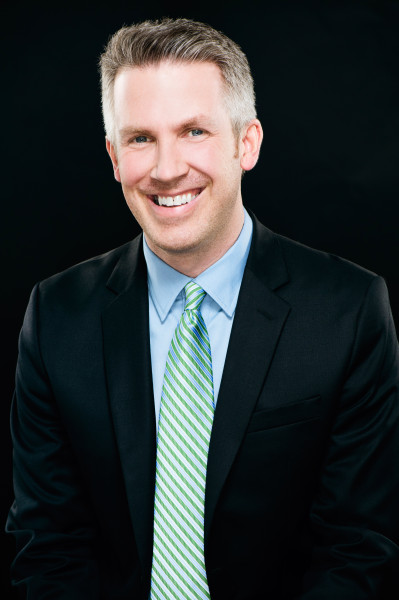
And yeah, then he decided to give it all up and move home. True story, believe it or not.
Be sure there is a difference between getting “burned out” and “getting tired of it,” and Elliott, a 1994 grad of the University of Pennsylvania, who earned his law degree at Georgetown (2001), makes that point because it was he who decided he just didn’t like much about that career. He wasn’t inspired. It became mundane, so he returned, and then he purchased the Professional Building on Market Street in downtown Wheeling. Six different businesses now operate on the first floor, and Elliott has continued the process of clearing the remaining five floors to prepare for future build-outs.
He is inspired now, he insists, and not just because he’s got a financial stake in the city’s financial district. It’s part of it, of course, but he says it’s more about what he sees as possible and what he believes he can do to make it happen.
Novotney: Why have you decided to run for mayor of Wheeling?
Elliott: There is a big-picture reason, and there is a personal reason.
On the big-picture side, I think that my experiences growing up here and living in some other communities in Philadelphia and near Washington, D.C., have allowed me to gain a lot of insight.
And then my experiences as someone who moved home and bought a building in downtown Wheeling, I think I have given me a pretty good idea what of Wheeling needs going forward.
I don’t want to take issue with everything the current council has done because I think they have done some good things, but I think I would have approached some things a little bit differently in terms of budget priorities. We’re in a situation where funds are going to be tight for the foreseeable future. We can’t spend money on everything. We can’t throw money at every problem, but I would like to re-assess some of our priorities.
On a procedural level, I think we have to do a better job of getting more people involved. I think we have to articulate what we want to do, why we’re going to do it, and actually solicit feedback from people in a way that’s not being done.
I think I am a good person who can see the big picture of what Wheeling needs.
On a personal level, I graduated from Linsly in 1990 with 55 people and I am aware of five of us in the Valley right now. That’s unacceptable, and it’s also embarrassing. But when I was in high school, all I wanted to do was leave. I don’t want any other child in a high school in this city to want to leave like I did. I don’t want that to be the first and foremost thing on his or her mind. We have to do a better job at making this city more attractive for folks, and also we have to take care of the folks who are already here.
Our population is aging, so we have to do something about it if we ever expect it to stop.
Novotney: You have communicated angst over the fact that the city of Wheeling fails to enforce an ordinance that mandates proper care of sidewalks during inclement weather.
How is that angst an example of your candidacy?
Elliott: As a lawyer, it bothers me. As a person who lives in downtown Wheeling, it bothers me on a personal level because I see downtown pedestrians dealing with the untreated walks.
If you have a law that’s on the books, and you choose not to enforce it, you open yourself up for legal challenges for the laws you do choose to enforce. It’s not the role of a council to pick and choose which ordinances are enforced. If they do not like it, then repeal it. But it’s there.
On a personal level, I live and work in downtown, and we cannot have a downtown that’s open for business and expect people to walk in it when a third of the property owners aren’t taking care of their sidewalks. I see a lot of residents living in our downtown high rises walking to stores who have a tough time walking on dry land, and the city is asking them to try to get to those places on ice-covered sidewalks. That’s unacceptable.
Most of those property owners are absentee owners, so they don’t see it, but if the city starts slapping a fine on them, that’s going to make them think twice about just letting them go until the temperatures get warmer.
Novotney: What will your reaction be if a voter looks at you and says, “You’re not from Wheeling. Why should you be the mayor?”
Elliott: I get that a lot because I spent almost two decades away from here. I was born here in 1971, and I love this city. But I did spend some time away, and I have a lot of catching up to do. I came home in 2009, and I have immersed myself in everything Wheeling since then, but I know at this point that I still have a lot to learn.
I plan to spend the next year knocking on as many doors as I can. I don’t know if I’ll be able to hit them all, but I certainly can try. I am going to talk with as many people as I can to see what the big issues are with the people of this city. My family on both sides goes back to the early 1800s and this is where I want to spend the rest of my life. It’s the city I love, and I am focused on running a really good campaign, learning as much as I can about the city and the people who live here, and seeing where the chips fall.
